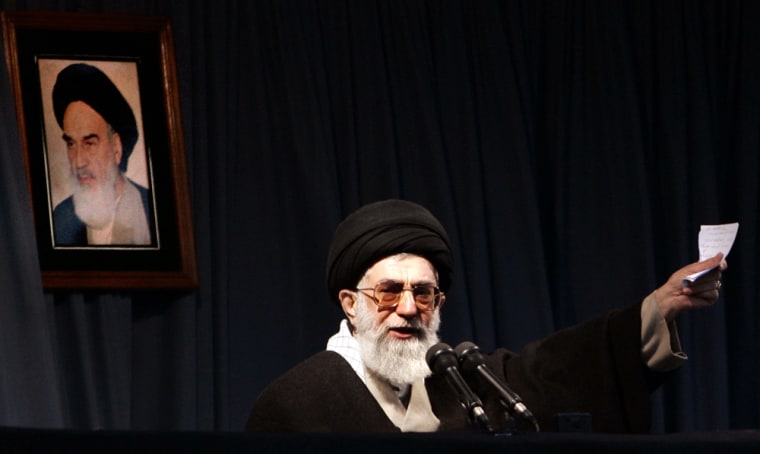Iran’s supreme leader Ayatollah Ali Khamenei said Tuesday that he approves of proposed talks between U.S. and Iranian officials on Iraq but warned that the United States must not try to “bully” Iran.
It was the first confirmation that Khamenei, who holds final say on all state matters in Iran, supports the talks. His comments appeared aimed at calming criticism by hard-liners over a major shift in policy by the regime, which long shunned high-level contacts with a country Tehran brands “the Great Satan.”
President Bush said Tuesday he favors the talks and that American officials would show Iran “what’s right or wrong in their activities inside of Iraq.”
Khamenei said that “if the Iranian officials can make the U.S. understand some issues about Iraq, there is no problem with the negotiations.”
“But if the talks mean opening a venue for bullying and imposition by the deceitful party (the Americans), then it will be forbidden,” he said in a nationally televised speech in the holy Shiite city of Mashhad in northeastern Iran.
Both the United States and Iran have said the talks will focus solely on stabilizing Iraq and not deal with the heated issue of Iran’s nuclear program. No time or place has yet been set for talks.
The ayatollah clarifies
Khamenei appeared to be weighing in to end hard-line criticism, while insisting Iran would not bow to the United States in any talks. He said some U.S. officials had depicted the talks as if the United States were “summoning Iranian officials.”
“I say here that the U.S. government has no right to summon Iranian officials,” Khamenei said.
Khamenei is considered the leader of hard-liners in Iran who largely prevented reformists from opening greater contacts with the United States. Still, under his rule, Iran has held lower-level talks with American officials, particularly in multilateral gatherings for efforts to stabilize Afghanistan and counter narcotics, for instance.
Iranian Foreign Minister Manouchehr Mottaki said Friday that the talks could help Iraq form a government, while Ali Larijani, the secretary of the Supreme National Security Council, said Iran hopes the meetings will help lead to U.S. troop withdrawal.
Iran has considerable influence with Shiite political parties who dominate Iraq’s parliament, and Secretary of State Condoleezza Rice has said U.S.-Iranian talks on Iraq could be “useful.”
U.N. council threat dismissed
In Tuesday’s speech, Khamenei also dismissed the threat of U.N. Security Council action over Iran’s nuclear program.
“They threatened us with the Security Council as if the council is the end of the world,” Khamenei said, adding that Iran will pursue its nuclear program and will achieve it with all its “heart and soul.”
Khamenei made the comments as the Security Council postponed a meeting Tuesday on Iran’s suspect nuclear program, searching for new ways to break a deadlock with Russia and China over the best way to pressure Tehran, diplomats said.
The United States accuses Iran of seeking to develop nuclear weapons; Iran says its program aims only to generate electricity and has insisted it has a right to carry out uranium enrichment, a key process that can develop either fuel for a reactor or material for a nuclear warhead.
Little progress on bridging differences
The decision to postpone the meeting came after senior diplomats from the five veto-wielding members of the council and Germany made little headway on bridging their differences during a 4½-hour meeting Monday evening. Diplomats said Russia was the main holdout, with China following behind.
That deadlock has forced Britain, France and Germany — the European troika leading negotiations on Iran — to reopen the text of a statement that would be the first Security Council response. Diplomats will focus on bilateral talks to try to find an agreement, they said Tuesday.
“We’ll just keep working on it,” U.S. Ambassador John Bolton said.
The United States and its European allies want a statement reiterating demands by the U.N. nuclear watchdog, the International Atomic Energy Agency, that Iran suspend uranium enrichment, the process that can be used to generate nuclear power or make nuclear weapons.
Diplomats said the Russians and Chinese have not budged from their opposition to tough language including a demand for a report in 14 days on Iran’s compliance with the IAEA demands. Moscow and Beijing have said that is not enough time, with China suggesting 30 to 45 days.
